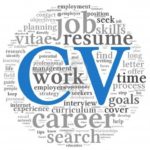 Throughout history, people way wiser than myself have counselled on the value of brevity.
Throughout history, people way wiser than myself have counselled on the value of brevity.
- “Good things, when short, are twice as good”. ~ Baltasar Gracián
- “The most valuable of all talents is that of never using two words when one will do.” ~Thomas Jefferson
- “….to talk well and eloquently was a very great art, but that an equally great one was to know the right moment to stop.” ~Wolfgang Amadeus Mozart
My A level Economics teacher Mr. Thomas, used to exhort our class to be “concise, precise and relevant” which reduces to a helpful acronym of C.P.R. Excellent advice which I can struggle with and have to be mindful of at times. It is indeed a skill and talent which if not innate, can be developed, importantly not to be confused with being monosyllabic or taciturn.
There is one place where the ability to be brief adds value. That’s in the interview process.
Brevity: the secret to a good interview
1. Brevity shows you understand that an interview is about creating a dialogue
And is not a monologue – especially in response to that old chestnut “tell me about yourself” – which is indeed a loaded question.
2. Brevity shows you know your stuff: your USP and Personal Brand
Who you are and where and how you add value! When you are concise, precise and relevant, you are able to highlight your strengths and success stories succinctly, inviting interviewers to pick up on the points that interest them the most. This could be important for you to sell certain parts of your experience and skills a little harder, or perhaps even to re-group if you need to.
3. Brevity shows that you are an active listener
The adage that we have two ears and one mouth and they should be used proportionately, comes into play here. If you are talking – you are not listening. This means that you could be missing key body language cues: drifting eye contact, fidgeting hands and so on, all signs that you are losing your audience. This strategy can include:
- Reflecting before responding: clarifying or paraphrasing the question if necessary to establish exactly what is required of you.
- The two minute rule: generally this is the right amount of time for one person to be holding forth without a break, unless you are making a presentation.
- Elaboration: Ask if your response has answered their question adequately and if they would like you to develop any point. That puts you firmly into the game and takes you out of a passive role.
5. Brevity allows you to conquer nerves
Many of us talk too much when we are nervous (I do!) but learn that this is what you do and set up some coping strategies and relaxation techniques to get you through the first difficult moments when nerves overtake you.
6. Brevity facilitates strategy
If you are concise, you can target your responses accordingly and feed in the information that you want to showcase strategically.
7. Brevity allows the interview to become a two way street
Many people overlook the fact that the candidate is also assessing the company, the position as well as the interviewing manager. If you have created time to listen by being succinct, you can observe communication styles, the surroundings, as well as interaction between the people involved in the process. Very often these can give telling signals about cultural fit.
George Burns said “The secret of a good sermon is to have a good beginning and a good ending; and to have the two as close together as possible.”
It can also be the secret to a good interview!
What stories do you have about talking too much?
C.P.R. is part of my career coaching programme. Get in touch now.






Brevity in interviews is hard to achieve, as you constantly feel you must sell yourself. This is a case of less is more. This article is a good reminder of that.
Pingback: Are you a job search bore? Story telling and job search | Dorothy Dalton
Pingback: Happiness At Work #97 ~ why our learning matters more than ever | performance~marks
Pingback: Most common job interview questions - 3Plus International
Pingback: How to Answer Interview Questions About Your Career Goals - 3Plus International